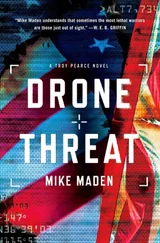“Unless it’s the same politicians who are writing the software. As a trained software engineer, Madame President, I’m afraid you possess a distinct advantage over the rest of us.” Myers had been the CEO of her own software-engineering company before she ran for governor of Colorado.
“Hardly. It won’t be long until we’ve developed software that can write its own software, so we poor humans will soon be out of the loop.”
“That’s a frightening thought, Madame President,” Strasburg said. “I’m glad I won’t be here when that happens.”
“It probably already has, Karl. They’re just not talking about it.” Myers took another sip of coffee, then set the cup down on the table in front of her. “So, Ambassador Britnev, to what do we owe the pleasure of your visit today?”
Britnev set his cup down, too. “First of all, President Titov asked me to send his personal condolences to you at your time of loss. The Russian people grieve with you.”
“Please thank President Titov for me for his kind thoughts.”
“He also pledges any assistance he can give you in your search for the murderers. We are not without some influence in Mexico and President Barraza seems to be a reasonable fellow.”
“We would greatly appreciate any assistance he can provide,” Myers said.
“We also understand borders. Unlike you, we have a thousand-year history of enemies violating ours.”
“An ocean on either side is our distinct advantage.” She grinned. “And Canadians to the north. Couldn’t be better neighbors.”
“Yes, Canadians. An amiable folk. Not like the Azeris.”
Myers and Strasburg shared a glance. So that’s why he asked for this meeting. Oil-rich Azerbaijan had just changed regimes.
“I should think you would welcome a peaceful, nonviolent, and secular revolution on your periphery,” Strasburg said.
“With a curiously pro-democracy, pro-Western, and pro-NATO orientation,” Britnev countered. “They almost sound Canadian, don’t they?” He chuckled at his own joke. “But maybe they’re more like the Mexicans, also swimming in oceans of oil and instability.”
“We’ll have to wait and see, won’t we? But so far, the Azeris don’t seem to pose any problems for your government, or am I missing something?” Myers asked.
“I believe Khrushchev said much the same thing to Eisenhower when Castro first came to power,” Britnev said.
“It was the Soviet missiles Castro allowed onto his island that caused the problem, as I recall,” Myers said.
“Ah, yes. I believe that is a correct understanding of the history, Madame President.” Britnev smiled.
Myers held his gaze. Is he worried about NATO missiles being deployed in Azerbaijan?
“And as I recall, the United States has a history of resolving its border issues with Mexico in a very direct way,” Britnev added. “Should I inform our government to expect a few fireworks? Frankly, we wouldn’t blame you. Sometimes the iron fist is the only solution. Don’t you agree, Dr. Strasburg?”
“This administration is pursuing other options. As the proverb says, ‘If all one owns is a hammer, then every problem looks like a nail.’”
“We’re committed to reducing our military footprint around the world,” Myers said. “The global community is becoming an increasingly complex and finely tuned mechanism, but war is a blunt-force instrument. We’re also trying to get our financial house in order. Our spending has been out of control and maintaining the Pax Americana is proving to be too expensive.”
“Weakness is even more expensive, Madame President. As victims of international banditry ourselves, we can perfectly empathize with your dilemma. This is why we believe that the ultimate way forward is through mutual cooperation and understanding between our nations whenever it is possible.”
“I quite agree, Ambassador. The United States is fully committed to mutual cooperation and understanding with the Russian Federation. How can our meeting today facilitate that process?”
“As you are both well aware, there is a growing Islamist threat all over the world. So-called Arab Springs.”
So it’s not about NATO missiles. “The world is changing,” Myers said. “The dialectic of history, I suppose.”
Britnev shrugged. “But such uprisings don’t emerge victorious without intervention, particularly without modern weapons and military advisors, usually from the West. And unfortunately, the uprisings have been usurped by forces even more despotic than the regimes they have replaced, wouldn’t you agree?”
“We’re no longer in the nation-building business, Mr. Ambassador, I assure you. We can’t control outcomes when regimes change,” Myers asserted. “But we can’t stand in the way of natural forces, either.”
“But the West has played an active role in the toppling of several regimes in the past decade and continues to meddle in the Syrian civil war. Our fear is the Caucasus. Islamo-fascism is rearing its ugly head again on our borders.”
“That is why you should welcome the Azeri revolution. Democracy is your best buffer,” Strasburg said.
“Hitler was democratically elected,” Britnev countered, “which is why we’re not as confident as you are in the benevolence of democratically elected governments. We prefer reliable allies bound to us with mutual strategic interests. Syria, for example.”
Syria had been Russia’s last great ally in the Middle East. The recent events there upset Russia’s security policy in the region.
“We assure you that past Western support for emerging democratic movements against dictatorships has never been an attempt to undermine the strategic security of the Russian Federation. It was due strictly to humanitarian concerns.”
Britnev set his coffee cup down as he gathered his thoughts. “In your inaugural address, Madame President, I believe you expressed your commitment to the rule of law.”
Myers stiffened. “Of course I did. We are a nation of laws, and we have tried to help build a just social order by supporting the rule of law both within and between nations. It’s the only alternative to war.”
Britnev nodded and softened his voice. “How then did violating the sovereignty of a nation like Libya logically cohere with that sentiment, if I may be so bold?”
“I believe President Obama was supporting European efforts to enforce a UN resolution. Despotic regimes like Gaddafi’s Libya do not respect the rule of law and they violate the civil rights of their citizens. By helping to facilitate the demise of dictatorships like his, the United Nations is ultimately affirming the universal rights of the Libyan people to live in a nation and world of just laws.”
“Yes, of course. That seems perfectly logical.” Britnev paused. “I remember during the financial crisis that President Bush declared that he had to abandon free-market principles in order to save the free market. I suppose that is the same sort of idea?”
“All of that is in the past. I assure you, Mr. Ambassador. My administration has set a new course. The United States is out of the business of picking winners and losers. It’s a fool’s errand, at best, as recent history has demonstrated,” Myers said. “Without putting too fine a point on it, we can assure you that this administration is committed to refraining from any destabilizing activities in the Caucasus.”
Britnev turned his gaze toward Myers. “We have your word on this?”
“You do,” she assured him.
Strasburg leaned forward. “I trust that your government appreciates the wisdom of the American people for having elected such a thoughtful and logical chief executive?”
“Indeed we do, Dr. Strasburg.” Britnev turned slightly to face Myers. “Madame President, you have exercised remarkable restraint in regard to the Mexican crisis. I’m not sure I would have been as rational as you had I been in your place.”
Читать дальше












